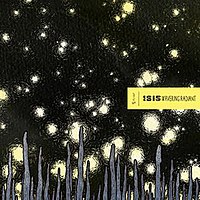
Band: Isis
Album: Wavering Radiant
Best song: “Ghost Key” is great. “20 Minutes/40 Years” is fantastic.
Worst song: “Threshold of Transformation” probably goes on too long.
The ocean, like business, with a pillowy abyss of a lover’s bosom, seems infinite, but all things must end.
— Don Geiss, in Yachting Illustrated
Isis’ farewell tour hit DC’s 9:30 club last week and I was in attendance. Isis’ live show has changed a bit in the six years I’ve been watching the band — Aaron Turner’s hair has gotten longer, the keyboards have taken a larger role in the music, different venues, etc. — but Isis never fails to entertain. I’m sad to see Isis go away, as I’ve seen the band the most of any artist. I always enjoy Isis shows.
—
I listen to Wavering Radiant a fair amount and I almost never get through the entire album. Indeed, Wavering Radiant just missed my best of the decade list, despite Isis’ first record being my favorite album of said decade.
Like so many artists’ later work, both the problem and the saving grace of Wavering Radiant is the weight of expectations. Isis’ previous album, In the Absence of Truth was a big disappointment for many — well, me. It disappointed me. — so the positive side is that Wavering Radiant was going to have to be better than In the Absence of Truth. Save for a total departure from Isis’ strengths — Pixies’ LOUDquietLOUD dynamic, anticipation in lieu of pummeling riffs, Turner’s minimalist lyrics, etc. — Wavering Radiant was destined to be a success.
But, comparative analysis cuts both ways. Wavering Radiant is not the album that Isis’ epic masterpiece is. Isis’ earlier work is stronger, certainly, but Panopticon is picture of the evolution of a band (in a good way) that brought in themes, styles and movements. Wavering Radiant is a mediocre recitation of that form, a reversion to the mean. With the band’s first three albums, there was growth. On the band’s final album, there’s little growth.
Like Panopticon, Wavering Radiant explores themes, though in Wavering Radiant, the Jungian psychology and afterlife themes are hard to digest. Like Panopticon, Wavering Radiant utitlizes a “wet” reverb guitar and bass sound, but Wavering Radiant takes it, I’d say, too far.
—
As for the afterlife/psychology themes, the album is a very good portrait of the difficulty of metaphor/analogy in art. Which is to say that the degree of difficulty is high. It’s tenuous, at best. Often, an artist can power through fractured and far too complex metaphors — Mastodon, anyone? — but it takes a degree of skill that most bands don’t have. Often, the metaphors are hacky and ham-handed.
To use an example: I watch the show True Blood. I’m not proud of this fact, but I do watch the show because it’s like candy. But, show creator Allan Ball bangs everyone across the face with the vampire/gay/race metaphor. It’s hacky and it’s doesn’t toe the line. It bangs all around the line.
On the other hand, a show like Lost — a show with which I’m not as familiar — falls flat with a lot of people because its metaphors and analogies are couched. The show’s early seasons played on the fear of a post-9/11 world and the unknown therein, but as the show progressed, metaphors fell more flat. A lot of people didn’t “get” the show’s final few seasons and episodes, despite the huge amount of Biblical and literary themes. It was often too buried, too layered and never paid off on the promise.
Finding the happy medium is the key, of course. Panopticon does this, as themes of surveillance, isolation and fear dot the record, playing off Turner’s minimalist lyrcics, dancing around Fouccault. It was timely and hit the perfect notes then as it does today. It’s a reminder of a time, yet timeless.
Wavering Radiant‘s lyrics are more robust than those on Panopticon, but more confusing. There’s little in the way of a literary outline and Turner himself said the album deals with a “path of exploration.” Death abounds — the first two (also, the best on the album) great songs speak of ghosts — and decay dots the record. The album’s lyrical connection to Tool — a band famous for heavily-veiled lyrics — is evident throughout the album, despite the record’s lack of lyrical strength.
—
Wavering Radiant is, actually, a very good album. It may be Isis’ most accessible album, musically. Turner’s death growl is at its most easy-to-digest and his more human vocals are prettier. Taking queues from Tool, Jeff Caxide’s bass is even more reverby (this gets a little annoying) and the keyboards on the record give the record a more progressive feel. “20 Minutes/40 Years” is dark and hard, while “Hall of the Dead” has a great mid-song breakdown, based on a heavy riff that reminds one of Panopticon‘s “In Ficton.”
As the record deals with the end of the mortal soul, the band will finish its farewell tour this year. Isis has been a great band, but all things must end.